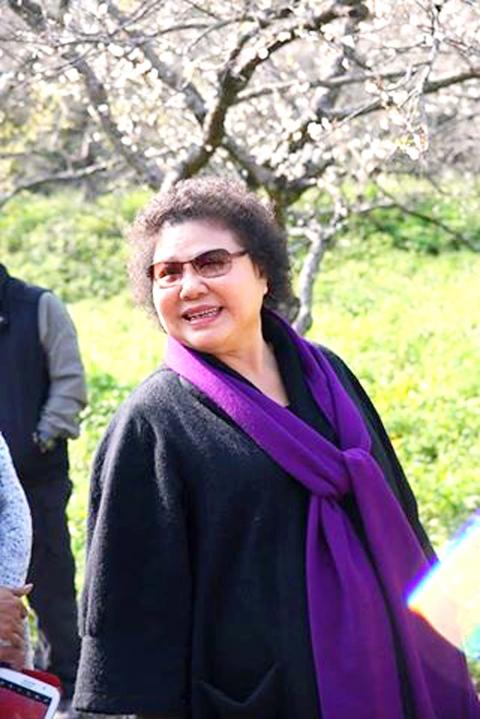The public sees Kaohsiung Mayor Chen Chu (陳菊) as the best performer among 12 of the nation’s political leaders, while President Ma Ying-jeou (馬英九) is ranked as the worst, according to an opinion poll released yesterday.
A Taiwan Mood Barometer Survey conducted by Taiwan Indicators Survey Research (TISR) this week was aimed at determining “favorability” of the politicians — defined as the public’s general impressions of the person’s personal characteristics and how “likable” (好感度) they are.
The Democratic Progressive Party’s (DPP) Chen scored a favorability rating of 72.5 percent, while Ma, a Chinese Nationalist Party (KMT) member, earned a 65.9 percent dissatisfaction rating.

Photo taken from Facebook
Independent Taipei Mayor Ko Wen-je (柯文哲) came in second behind Chen in terms of favorability with 71 percent, followed by DPP Tainan Mayor William Lai (賴清德) with 65.3 percent, KMT Legislative Speaker Wang Jin-pyng (王金平) with 63.6 percent, New Taipei City Mayor and KMT Chairman Eric Chu (朱立倫) with 62.1 percent and DPP Chairperson Tsai Ing-wen (蔡英文) with 60.9 percent.
Scoring less well were new Taichung Mayor Lin Chia-lung (林佳龍) — a former DPP legislator — who received 53.6 percent, former Taipei mayor Hau Lung-bin (郝龍斌) of the KMT with 35.2 percent and Taoyuan Mayor Cheng Wen-tsan (鄭文燦) of the DPP — a former minister of the now-defunct Government Information Office — with 34.4 percent.
Three top KMT politicians rounded out the bottom of the favorability rankings: Premier Mao Chi-kuo (毛治國) with 28.1 percent, Vice President Wu Den-yih (吳敦義) with 22.2 percent and Ma with just 21.8 percent.
Far fewer respondents expressed dissatisfaction with Chen (13.4 percent) or Ko (15.4 percent) compared with Ma and his 65.9 percent rating.
The survey of Taiwanese aged 20 year-old or above was conducted from Monday to Wednesday using computer-
assisted telephone interviewing and random-digit-dial systems. A total of 1,006 valid surveys were collected.
The survey has a margin of error of 3.1 percentage points.

US President Donald Trump yesterday announced sweeping "reciprocal tariffs" on US trading partners, including a 32 percent tax on goods from Taiwan that is set to take effect on Wednesday. At a Rose Garden event, Trump declared a 10 percent baseline tax on imports from all countries, with the White House saying it would take effect on Saturday. Countries with larger trade surpluses with the US would face higher duties beginning on Wednesday, including Taiwan (32 percent), China (34 percent), Japan (24 percent), South Korea (25 percent), Vietnam (46 percent) and Thailand (36 percent). Canada and Mexico, the two largest US trading

AIR SUPPORT: The Ministry of National Defense thanked the US for the delivery, adding that it was an indicator of the White House’s commitment to the Taiwan Relations Act Deputy Minister of National Defense Po Horng-huei (柏鴻輝) and Representative to the US Alexander Yui on Friday attended a delivery ceremony for the first of Taiwan’s long-awaited 66 F-16C/D Block 70 jets at a Lockheed Martin Corp factory in Greenville, South Carolina. “We are so proud to be the global home of the F-16 and to support Taiwan’s air defense capabilities,” US Representative William Timmons wrote on X, alongside a photograph of Taiwanese and US officials at the event. The F-16C/D Block 70 jets Taiwan ordered have the same capabilities as aircraft that had been upgraded to F-16Vs. The batch of Lockheed Martin

China's military today said it began joint army, navy and rocket force exercises around Taiwan to "serve as a stern warning and powerful deterrent against Taiwanese independence," calling President William Lai (賴清德) a "parasite." The exercises come after Lai called Beijing a "foreign hostile force" last month. More than 10 Chinese military ships approached close to Taiwan's 24 nautical mile (44.4km) contiguous zone this morning and Taiwan sent its own warships to respond, two senior Taiwanese officials said. Taiwan has not yet detected any live fire by the Chinese military so far, one of the officials said. The drills took place after US Secretary

THUGGISH BEHAVIOR: Encouraging people to report independence supporters is another intimidation tactic that threatens cross-strait peace, the state department said China setting up an online system for reporting “Taiwanese independence” advocates is an “irresponsible and reprehensible” act, a US government spokesperson said on Friday. “China’s call for private individuals to report on alleged ‘persecution or suppression’ by supposed ‘Taiwan independence henchmen and accomplices’ is irresponsible and reprehensible,” an unnamed US Department of State spokesperson told the Central News Agency in an e-mail. The move is part of Beijing’s “intimidation campaign” against Taiwan and its supporters, and is “threatening free speech around the world, destabilizing the Indo-Pacific region, and deliberately eroding the cross-strait status quo,” the spokesperson said. The Chinese Communist Party’s “threats